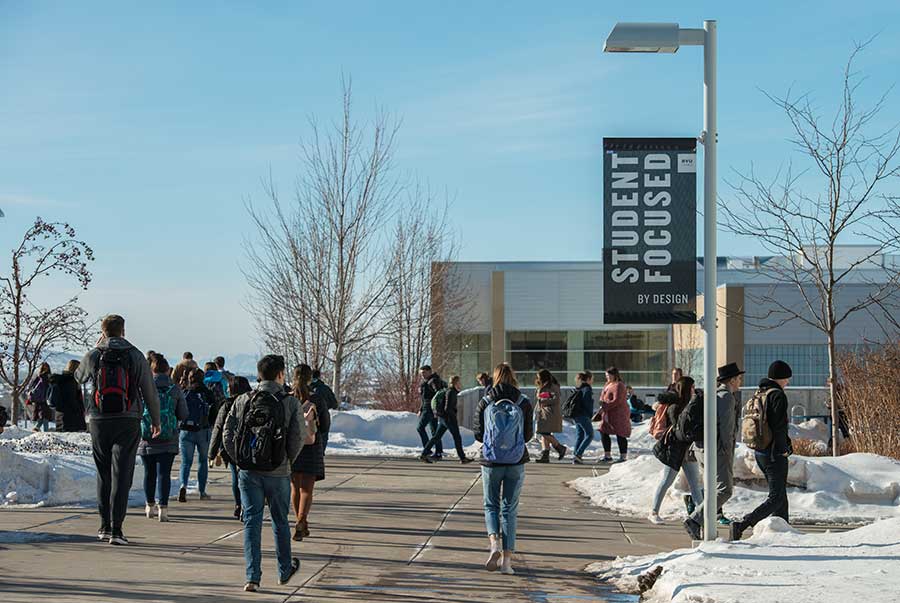Petition started regarding Brigham Young University-Idaho’s rejection of Medicaid expansion
Published at | Updated at
REXBURG — Students and policy advocates are speaking out about Brigham Young University-Idaho’s decision to reject Medicaid and the university’s failure to say why.
A petition demanding BYU-Idaho explain its decision to reject Medicaid as adequate health coverage has received more than 5,700 signatures as of Tuesday morning. A Facebook group protesting the policy has garnered 349 members, the American Civil Liberties Union of Idaho has called on the university to listen to students and Reclaim Idaho, the organization that strongly advocated for Medicaid Expansion in Idaho, has issued statements objecting to the new policy.
After refusing to comment to several media organizations last week about the change, BYU-Idaho officially made a short statement Friday evening.
“The university has decided to not accept the Idaho Expanded Medicaid program, which takes effect January 1, 2020, to serve as an insurance waiver option,” BYU-Idaho’s statement reads. “We welcome concerned students to visit with Health Center representatives for more information about their healthcare options.”
BYU-Idaho, BYU-Provo, BYU-Hawaii and LDS Business College, schools owned by The Church of Jesus Christ of Latter-day Saints, require students to have health insurance to enroll. BYU-Idaho is the only school not accepting Medicaid as adequate health coverage. As a result, BYU-Idaho students who use Medicaid are now required to either purchase traditional insurance or the university’s healthcare plan.
“It just kind of came out of the blue and blindsided everybody. There was no warning. There was no time to prepare for it,” Tanner Emerson said.
Emerson and his wife Amanda are seniors at BYU-Idaho. After Amanda received an email saying the school would not accept her Medicaid coverage, the two decided to start the Accept Medicaid BYU-I Facebook group.
“When I saw that there were other people who were frustrated about it, my wife and I both just really felt like we needed to be involved and try to do something about it,” Tanner said.
That “something” is organizing campaigns against the new policy.
In a recent post on the Facebook group, Amanda offered suggestions on how to make sure the school administration hears students’ complaints. She suggested repeatedly commenting on all of BYU-Idaho’s main social media accounts and to do the same on school officials’ social media accounts. She posted the email addresses of BYU-Idaho President Henry J. Eyring and other school administrators.
“These online tactics are a good start, but we do need to come up with a way to confront them and talk to them in person,” Amanda said in her Facebook post.
ACLU Idaho Executive Director Leo Morales told EastIdahoNews.com they have received numerous complaints from BYU-Idaho students about the university’s policy.
“We believe it’s extremely important for the university to sit down and listen to the valid concerns of the students,” Morales said.
Reclaim Idaho, a major proponent of Medicaid expansion, has also gotten involved in the debate. They released the following statement over the weekend.
“The university is putting students and families at risk with these sudden and unexplained decisions. This was a bad week for the entire BYU-Idaho community,” Reclaim Idaho Co-Founder Luke Mayville said in a news release. “We are hearing from students, families and volunteers throughout Madison County and eastern Idaho who are outraged by the university’s choice to reject healthcare options for their 20,000 students.”
Reclaim Idaho Executive Director Rebecca Schroeder urged BYU-Idaho to explain its decision.
“The vast majority of students and families we’re hearing from can’t believe the university would make such punitive decisions without explaining why,” Schroeder said in a news release. “In one paragraph in a press release, they dropped a bombshell on hundreds, if not thousands, of students and are wiping their hands of the issue. The BYU-Idaho community deserves much better than that.”
Tanner said a staff worker at the BYU-Idaho Health Center told him that the school’s reasoning is the university is afraid the influx of students who qualify for expanded Medicaid will not be able to get adequate health care in Madison County due to the small number of healthcare providers in the area.
EastIdahoNews.com has not been able to confirm that explanation, and questions to BYU-Idaho about their policy have gone unanswered.
Idaho Department of Health and Welfare spokeswoman Niki Forbing-Orr told the BYU-Idaho Scroll newspaper that, currently, 6,420 individuals are on Medicaid in Madison County. She said 1,542 more Madison County residents have enrolled in Medicaid, which will activate when the expansion goes into effect on Jan. 1, 2020.
“We don’t know that (Medicaid expansion) is actually going to cause that issue. And on top of that, it’s my health insurance and my health care. I should be able to choose,” Tanner said. “Any health insurance that’s federally accepted should also be accepted by the university … what health insurance I have should be up to me, not up to the university.”
Tanner said he and Amanda hope that the university will reverse its decision not to accept Medicaid. Barring that, they hope BYU-Idaho will offer a better explanation.
“At the least, we would like to get the university talking to us and having more open communication than they have had. Much more open,” he said.



